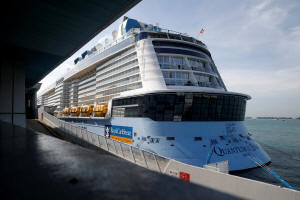Cabin fever: Singapore cruise passengers stuck in rooms after COVID-19
case
 Send a link to a friend
Send a link to a friend
 [December 09, 2020]
By Chen Lin and Yi Shu Ng [December 09, 2020]
By Chen Lin and Yi Shu Ng
SINGAPORE (Reuters) - Nearly 1,700
passengers on a Royal Caribbean 'cruise-to-nowhere' from Singapore
remained confined in their cabins for more than 14 hours on Wednesday
after a COVID-19 case was detected on board, forcing the ship back to
port.
All passengers aboard the Quantum of the Seas vessel had cleared a
mandatory polymerase chain reaction (PCR) test for the virus up to three
days before the four-day cruise started on Monday.
Authorities said close contacts of the patient among the 1,680 guests
and 1,148 crew members on board have so far tested negative and that all
passengers must isolate in their rooms as contact tracing continued on
Wednesday afternoon.
The patient, an 83-year-old male, had reported to the ship's medical
centre with diarrhoea and a subsequent onboard test revealed the
infection. He was taken to hospital on Wednesday after the ship returned
to port.

Other guests, who authorities say may be able to leave the ship on
Wednesday evening, were awoken with the news of the infection in the
early hours.
"I was like: 'there it goes, the worst fear has happened'," said
passenger Melvin Chew, a 31-year-old business development manager, who
said he learned about the infected guest via an announcement on the
ship's tannoy around 3 a.m. (1900 GMT Tuesday).
The Quantum of the Seas returned to Singapore at 8 a.m. local time (0000
GMT), and as of 5 p.m. passengers were still being asked to isolate in
their cabins. All passengers will undergo mandatory COVID-19 testing
before leaving the terminal.
The patient, wearing a full-length white protective suit, was escorted
down the ship's gangway to a waiting ambulance just after 2 p.m.
Shortly after, the ship's captain told passengers over the tannoy that
the ship was being deep-cleaned and that a further update would come
around 7 p.m.
"We do understand that this is not how you planned to spend your cruise
and again ladies and gentlemen, I am terribly sorry," the captain said
in a recording heard by Reuters.
"REALITY CHECK"
The 'cruise-to-nowhere' by Royal Caribbean is one of its first sailings
since the company halted global operations in March due to the
coronavirus.
The sailing in waters off Singapore is open only to Singapore residents
and makes no stops.
[to top of second column]
|

Royal Caribbean's Quantum of the Seas cruise ship docks at Marina
Bay Cruise Center after a passenger tested positive for coronavirus
disease (COVID-19) during a cruise to nowhere, in Singapore,
December 9, 2020. REUTERS/Edgar Su

The cruises are a part of Singapore's plans to revive its tourism
industry that has been battered due to the novel coronavirus, which
has infected more than 67.7 million people globally and killed
1,548,575.
Singapore, which has had just over 58,000 cases and 29 deaths, has
been reporting less than a handful of daily infections in recent
weeks.
Part of the precautions for the resumption of cruises in Singapore
involved pre-departure testing within 48 to 72 hours prior to
boarding and for guests to carry an electronic contact tracing
device, wear masks and social distance at all times.
"I really don't know how the patient has gotten it," said another
passenger Muhammad Rezal Ramli, 40, who had taken the cruise with
his two young children.
Infectious diseases experts said there could be many reasons why the
patient got through pre-departure screenings.
They said the PCR test may have been a false negative or did not
pick up fragments of an old virus, or the patient may have been
incubating at the time or was infected between the test and
boarding.
"It is a reality check that the current tests are not perfect," said
Paul Tambyah, President of the Asia Pacific Society of Clinical
Microbiology and Infection.
The infected case's close contacts will be placed in quarantine or
health surveillance, Singapore's health ministry said in an advisory
sent to passengers.

Others will need to monitor their health, while continuing regular
activities including going to school or work, and undergo a swab
test at the end of a 14-day monitoring period.
(Reporting by Chen Lin, Yi Shu Ng, Aradhana Aravindan and John
Geddie; Writing by John Geddie and Aradhana Aravindan; Editing by
Michael Perry and Raju Gopalakrishnan)
[© 2020 Thomson Reuters. All rights
reserved.] Copyright 2020 Reuters. All rights reserved. This material may not be published,
broadcast, rewritten or redistributed.
Thompson Reuters is solely responsible for this content. |